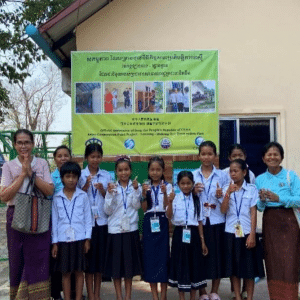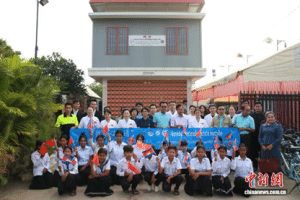A recent charity initiative by internet giant Tencent has proved very successful, but unfortunately also generated some controversy. On August 29th, Tencent’s charity platform (腾讯公益平台) launched a creative philanthropy program called “One yuan paintings”, part of its “Lighting life up with art” project. The program consisted in allowing Wechat users to buy paintings created by people suffering from mental disabilities like autism, cerebral palsy and Down’s syndrome. The paintings, 36 in total, were sold for prices as low as 1 Yuan. Within a few hours, the campaign had already reached its goal of raising 15 million RMB, after which the donations function was closed. A total of 5.8 million people donated to buy the art work.
The campaign was initiated by the “Shenzhen Love for the future Charity Foundation” (爱佑未来慈善基金会) and executed by the Shanghai-based World of Art Brut Culture (WABC, 上海艺途公益基金会), an NGO dedicated to helping people with special needs. Its aims are described as helping sufferers of mental disabilities to better integrate into society, and remove social prejudice by presenting their paintings.
Although the project was highly successful and drew many positive reactions, unfortunately there were also more than a few who voiced suspicion and skepticism in online forums. Claims emerged that the paintings were not really the work of disabled people themselves, or that they were just following the indications of trainers. More seriously, rumours quickly started to spread through WeChat that the project is really just a scam concocted by “investors” who will end up pocketing most of the donations, while the disabled painters will only receive “less than 10%”.
Tencent felt forced to publicly respond to these claims, clarifying that there are no “investors” involved in the program, and that it is the result of a cooperation between Tencent and WABC; Tencent provided the platform for people to make the donations, and all the money went to the public account “Love for the future Charity Foundation”. Staff from the foundation also spoke to the respected Charity Times (公益时报), assuring that all the donations had entered the account, and that the funds will be used to fund WABC’s “art therapy” for those who suffer from mental or psychological problems.
It is unfortunately common in China for online fundraising campaigns to be met with rumours and misgivings, which quite often (as in this case) appear to be unfounded. Recent controversies like the case of Luo Er, a Shenzhen man who used WeChat to fundraise for his little daughter with leukemia, only for accusations regarding his financial status and motivations to emerge (see CDB’s report here), have served to further dent public confidence.



